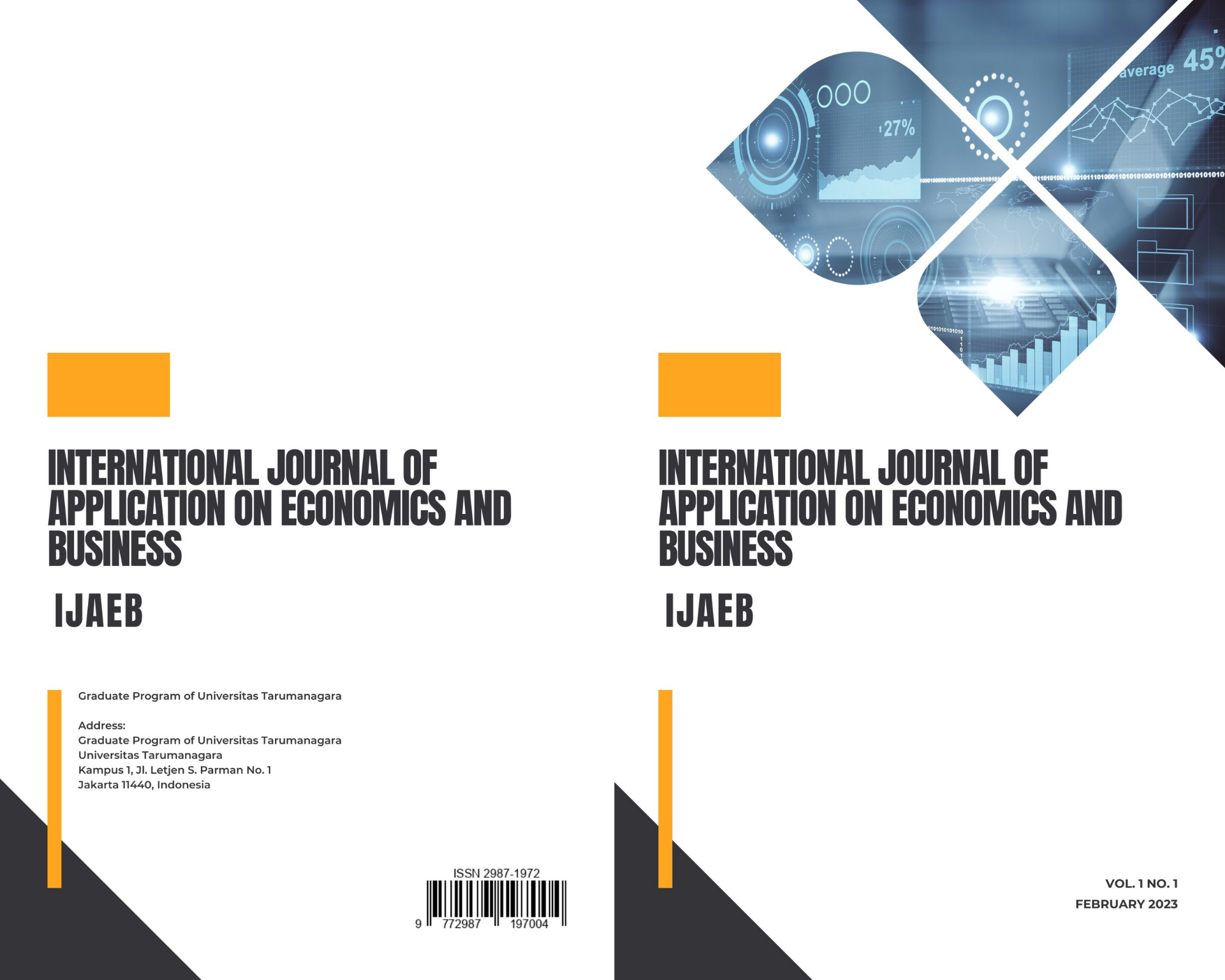Modeling of Sustainability Knowledge: Under Perception on Entrepreneurship Students
Main Article Content
Abstract
As aligning with sustainability issues, the study generates about modeling of sustainability knowledge with a factor analysis approach based on sustainable development goals (SDGs). The population involves entrepreneurial students with processing techniques using factor analysis using SPSS (n=150). The result of testing the Principal Component Analysis method provides the largest contribution of 57.817% with forming four components grouped in Component 1. However, the result is not logical so a rotation process is carried out with several methods including Equamax. After rotating, it produces four components, namely: Component 1 includes SDGs_3, SDGs_4, SDGs_7, SDGs_13, SDGs_17 with the name domain of social equity. Component 2 includes SDGs_9, SDGs_10, SDGs_11, SDGs_14, SDGs_15, SDGs_16 with domain of environmental sustainability. Component 3 includes SDGs_5, SDGs_6, SDGs_12 with the name domain of cultural responsibility. Lastly, Component 4 includes SDGs_1, SDGs_2, SDGs_8 with the domain of economic viability. Based on these results is concluded that the sustainable knowledge construct consists of four dimensions, such as social equity, environmental sustainability, cultural responsibility, and economic viability which are aligned with the pillars of sustainable development. It may be considered to enhance sustainability entrepreneurial learning at the university level.
Article Details
Section

This work is licensed under a Creative Commons Attribution-NonCommercial-ShareAlike 4.0 International License.
This journal provides immediate open access to its content on the principle that making research freely available to the public supports a greater global exchange of knowledge.
IJAEB by Graduate Program of Universitas Tarumanagara is licensed under a Creative Commons Attribution-NonCommercial-ShareAlike 4.0 International License.. Permissions beyond the scope of this license may be available at https://journal.untar.ac.id/index.php/ijaeb
References
Y. Kaijun, P.I. Sholihah. “A comparative study of the Indonesia and Chinese educative system concerning the dominant incentive to entrepreneurial spirit (desire for a new venturing) of business school students”. Journal of Innovation and Entrepreneurship, 2015, pp. 1-16. DOI: 10.1186/s13731-014-0014-0.
M. Fanea-Ivanovici, H. Baber. “Sustainability at Universities as a Determinant of Entrepreneurship for Sustainability”. Sustainability, 14, 454, 2022, 1-13. https://doi.org/10.3390/ su14010454.
I. Hussain, M. Nazir, S.B. Hashmi, A. Di Vaio, I. Shaheen, M.A. Waseem, A. Arshad. “Green and sustainable entrepreneurial intentions: A mediation-moderation perspective”. Sustainability, 13, 8627, 2021, 1-13. https://doi.org/10.3390/ su13158627.
K. Nuringsih, M.N. Nuryasman. “The Role of green entrepreneurship in understanding Indonesia economy development sustainability among young adults”. Estudios de Economia Aplicada, vol. 39, issue 12, 2021. https://ojs.ual.es/ojs/index.php/eea/article/view/6021.
J. Elkington. Chapter 1: Enter the Triple Bottom Line, 1-17, 2004
B. Bird. “Implementing entrepreneurial ideas: The case for intention”. Academy of Management Review, 13 (3), 1988, 442-453.
K. Nuringsih, I. Puspitowati. “Determinants of eco entrepreneurial intention among students: Study in the entrepreneurial education practices”. Advanced Science Letters, 23(8), 2017, 7281–7284. DOI: 10.1166/asl.2017.9351.
K. Nuringsih, M.N. Nuryasman, I. Prasodjo, R. Amelinda. “Sustainable entrepreneurial intention: the perceived of triple bottom line among female students”. Jurnal Manajemen, Vol. XXIII(02), June, 2019, 168-190. DOI: http://dx.doi.org/10.24912/jm.v23i2.472.
V. Valenrie, K. Nuringsih. “Fostering eco-entrepreneurial intention among students”. Proc. Int. Conf. Econ. Business, Soc. Humanit. (ICEBSH 2021), vol. 570, 985–992, 2021, doi: 10.2991/assehr.k.210805.155.
B. Mayoshe, K. Nuringsih. “Understanding entrepreneurial passion among new entrepreneurs”. Proc. Int. Conf. Econ. Business, Soc. Humanit. (ICEBSH 2021), vol. 570, 251–257, 2021, doi: 10.2991/assehr.k.210805.040.
I. Ajzen. “The Theory of Planned Behavior”. Organizational Behavior and Human Decision Processes, 50(2), 1991, 179–211. https://doi.org/10.1016/0749-5978(91)90020-T.
A. Kollmuss, J. Agyeman. “Mind the gap: why do people act environmentally and what are the barriers to pro-environmental behavior?”. Environmental Education Research, 8 (3), 2002, 239-260. DOI: 10.1080/13504620220145401.
K.S. Nakyejwe, K. Sendawula, M. Humphrey, H.M, Sabi. “Sustainable entrepreneurship of small businesses in Uganda: A confirmatory factor analysis”. African Journal of Business Management, vol. 15(5), 2021, 139-151, DOI: 10.5897/AJBM2021.9207.
G.R. Sargani, D. Zhou, H.M. Raza, Y. Wei. “Sustainable entrepreneurship in the agriculture sector: The nexus of the triple bottom line measurement approach”. Sustainability, 12(8), 2020, 3275–3300. https://doi.org/10.3390/su12083275.
S. Schaltegger, M. Wagner. “Sustainable entrepreneurship and sustainability innovation: Categories and interactions”. Business Strategy and the Environment Bus. Strat. Env. 20. 2011, 222–237.
I.A. Majid, W-L. Koe. “Sustainable entrepreneurship (SE): A Revised model based on triple bottom line (TBL). International Journal of Academic Research in Business and Social Sciences, June, vol. 2 No. 6, 2012, 293-310.
A.D. Racelis. “Sustainable entrepreneurship in Asia: a proposed theoretical framework based on literature review”. Journal of Management for Global Sustainability, vol.2, issue 1, 2014, 49–72.
R. Romanowski, M. Gnusowski. “Green Entrepreneurship in The Quintaple Helix Model”. In R. Romanowski (Ed.), Managing Economic Innovations – Ideas and Institutions, 2019, 103–118. Bogucki Wydawnictwo Naukowe. https://doi.org/10.12657/9788379862764-7.
F.M. Belz, J.K. Binder. “Sustainable entrepreneurship: A convergent process model”. Business Strategy and the Environment, 26(1), 2017, 1–17. https://doi.org/10.1002/bse.1887.
N.H. Othman, N. Othman. “A Systematic review on entrepreneurship education in higher learning institutions in Southeast Asia”. Universal Journal of Educational Research, 7(11), 2019, 2406–2416. https://doi.org/10.13189/ujer.2019.071118.
N. Masri, A. Abdullah, S. Asimiran, Z. Zaremohzzabieh. “Relationship between engagement in learning entrepreneurship education and entrepreneurial intention among vocational college students”. Pertanika Journal of Science and Technology, 29(S1), 2021, 19–38. https://doi.org/10.47836/pjssh.29.s1.02.
H. Peng, B. Li, C. Zhou, B.M. Sadowski. “How does the appeal of environmental values influence sustainable entrepreneurial intention?”. International Journal of Environmental Research and Public Health, 18(3), 2021, 1070–1095. https://doi.org/10.3390/ijerph18031070.
S.F. Peris, K. Supian, M.W. Hasanat, M.N. Hossain. “A Mediating effect of green market orientation on the environmental performance: From a literature review to a conceptual framework”. Journal of Management Info. vol. 7, No. 2, 2020, 92-118. Doi: 10.31580/jmi.v7i2.1421.

